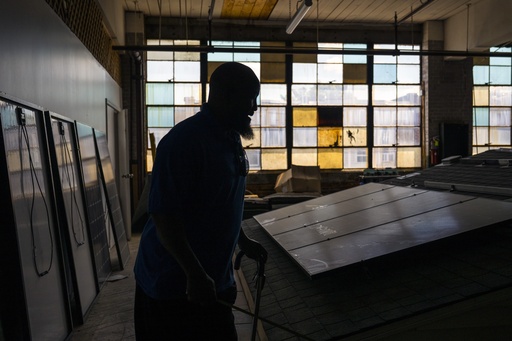
PHILADELPHIA — Within a repurposed warehouse situated in one of Philadelphia’s economically challenged areas, a group of students gathers around Jackie Robinson, who instructs them about a furnace from the 1980s. This hands-on approach, utilizing older equipment, is part of an innovative program focusing on preparing individuals for careers in the home improvement sector while addressing climate change and making clean energy more accessible.
More than 3.3 million individuals are currently employed in the clean energy sector, and this figure is rapidly increasing. Robinson, a skilled instructor in building trades, worries that many people remain unaware of these career opportunities.
“Many low-income individuals are oblivious to the existence of these jobs … it’s crucial to spread the word,” he expressed.
Alongside the urgent need for workforce expansion, providing solid career pathways can also aid in reducing recidivism rates. Robinson embarked on his journey into the clean energy field after spending a significant period in prison.
He was incarcerated for 27 years due to a drug-related conviction.
“I was undoubtedly a bright student during my school years. Yet, I fell into the wrong crowd, thinking I was clever, chasing fast money. But ultimately, I realized there’s no positive outcome to that path,” he reflected.
The wellbeing of his three young children inspired Robinson to make the most of his time in prison by acquiring new skills to support them once he was released.
During his time behind bars, he engaged in various courses, including welding, carpentry, accounting, fashion merchandising, and Arabic. “If there was a free educational opportunity, I seized it,” he stated.
“They held my physical body captive,” he continued, gesturing to his eyes, “but in my mind, I could explore countless possibilities.”
Robinson first encountered the energy industry through classes offered by Johnson Controls, an international building equipment firm. In these sessions, he gained hands-on experience working with refrigerators, HVAC systems, and more. Upon release, he became one of the individuals hired by the company.
Following his time there and at another organization providing apprenticeship opportunities, Connection Training Services, he joined Energy Coordinating Agency, a nonprofit focused on equity, located in a vast warehouse once used for sewing Civil War uniforms. Here, students can practice installing solar panels on a life-size rooftop model and work with exposed piping setups.
As Robinson, 59, leads his students into a back classroom for a lesson on circuits, he gestures to a wall painted with a quote from Benjamin Franklin: “He who hath a trade, hath an estate.” This phrase encapsulates his commitment to teaching valuable skills. “It transforms the financial future of families,” he remarked. “As economic conditions in the community improve, we elevate the standards of living overall.”
For Quenton McClellan, 61, this education opportunity represented a significant turning point. He learned about the program through a workforce advisor associated with Narcotics Anonymous. Previously a bartender grappling with substance abuse, he decided to seek help after a period of self-reflection.
Now, nearing two years of sobriety, McClellan stated, “It feels amazing, as I can think clearly now, unlike before. I’m eager to learn and grow.” He emphasized the camaraderie among students, something he felt was previously absent in his life.
Currently, he is working towards certification in installing heat pumps, a more eco-friendly alternative to traditional heating systems.
“The demand for workers in this field is immediate and urgent, with organizations needing to train them,” noted Bob Keefe, the executive director of Environmental Entrepreneurs (E2), a nonpartisan group advocating for clean energy.
The Inflation Reduction Act of 2022, which includes tax credits for heat pumps, solar installations, and incentives for clean energy manufacturing, is projected to create over 109,000 new job opportunities, Keefe explained. The versatility of heat pumps means that technicians will be needed across every state.
“I faced a challenging time trying to find someone to install heat pumps in my house a few years ago; I had to take matters into my own hands,” he recounted.
As Robinson conducts a session on installing these modern heating systems, he notices some students distracted by their phones and makes a mental note to reconnect with them later. He frequently reaches out to students via text to offer support and guidance beyond the classroom environment.
Each year, the Energy Coordinating Agency trains over 200 individuals to become building analysts, solar panel installers, and specialists in commercial HVAC systems. Classes are provided free of charge, funded through various grants. The agency also extends utility bill assistance and budget counseling to low-income residents in the area.
Observing students who have felt marginalized reintegrating into society and supporting their families brings Robinson a sense of fulfillment. “This work is my legacy. I’ve realized I possess skills I can pass down, enabling others to achieve a stable income and build generational wealth,” he said.

